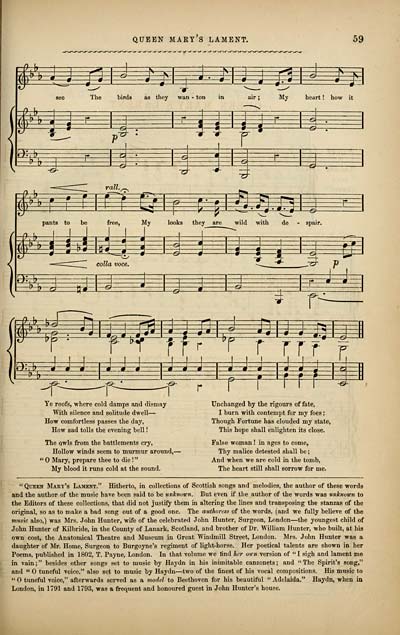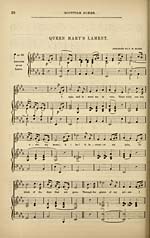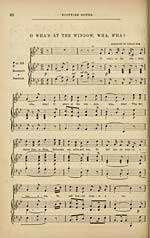Inglis Collection of printed music > Printed music > Songs of Scotland adapted to their appropriate melodies > Volume 2
(71) Page 59
Download files
Complete book:
Individual page:
Thumbnail gallery: Grid view | List view

QUEEN MARYS LAMENT.
59
feB=a.
m^^^^m
see The birds as they wan - ton in air ; My heart ! how it
PP
E5;
&t
BJ5
r
BE
_<3
f
rail.,
F=(=i B =?
S=s
3E
^
:nr
3F*
1 y r \
pants to be free, My looks they are wild with de - spair.
rT^r=w
Unchanged by the rigours of fate,
I burn with contempt for my foes ;
Though Fortune has clouded my state,
This hope shall enlighten its close.
False woman ! in ages to come,
Thy malice detested shall be;
And when we are cold in the tomb,
The heart still shall sorrow for me.
-f-
-Gh
Ye roofs, where cold damps and dismay
With silence and solitude dwell —
How comfortless passes the day,
How sad tolls the evening bell !
The owls from the battlements cry,
Hollow winds seem to murmur around, —
" Mary, prepare thee to die ! "
My blood it runs cold at the sound.
" Queen Mart's Lament." Hitherto, in collections of Scottish songs and melodies, the author of these words
and the author of the music have been said to be unknown. But even if the author of the words was unknown to
the Editors of these collections, that did not justify them in altering the lines and transposing the stanzas of the
original, so as to make a bad song out of a good one. The authoress of the words, (and we fully believe of the
music also,) was Mrs. John Hunter, wife of the celebrated John Hunter, Surgeon, London — the youngest child of
John Hunter of Kilbride, in the County of Lanark, Scotland, and brother of Dr. William Hunter, who built, at his
own cost, the Anatomical Theatre and Museum in Great Windmill Street, London. Mrs. John Hunter was a
daughter of Mr. Home, Surgeon to Burgoyne's regiment of light-horse. Her poetical talents are shown in her
Poems, published in 1802, T. Payne, London. In that volume we tind her own version of "I sigh and lament me
in vain;" besides other songs set to music by Haydn in his inimitable canzonets; and "The Spirit's song,"
and " tuneful voice." also set to music by Haydn — two of the finest of his vocal compositions. His music to
" tuneful voice," afterwards served as a model to Beethoven for his beautiful " Adelaida." Haydn, when in
London, in 1791 and 1793, was a frequent and honoured guest in John Hunter's house.
59
feB=a.
m^^^^m
see The birds as they wan - ton in air ; My heart ! how it
PP
E5;
&t
BJ5
r
BE
_<3
f
rail.,
F=(=i B =?
S=s
3E
^
:nr
3F*
1 y r \
pants to be free, My looks they are wild with de - spair.
rT^r=w
Unchanged by the rigours of fate,
I burn with contempt for my foes ;
Though Fortune has clouded my state,
This hope shall enlighten its close.
False woman ! in ages to come,
Thy malice detested shall be;
And when we are cold in the tomb,
The heart still shall sorrow for me.
-f-
-Gh
Ye roofs, where cold damps and dismay
With silence and solitude dwell —
How comfortless passes the day,
How sad tolls the evening bell !
The owls from the battlements cry,
Hollow winds seem to murmur around, —
" Mary, prepare thee to die ! "
My blood it runs cold at the sound.
" Queen Mart's Lament." Hitherto, in collections of Scottish songs and melodies, the author of these words
and the author of the music have been said to be unknown. But even if the author of the words was unknown to
the Editors of these collections, that did not justify them in altering the lines and transposing the stanzas of the
original, so as to make a bad song out of a good one. The authoress of the words, (and we fully believe of the
music also,) was Mrs. John Hunter, wife of the celebrated John Hunter, Surgeon, London — the youngest child of
John Hunter of Kilbride, in the County of Lanark, Scotland, and brother of Dr. William Hunter, who built, at his
own cost, the Anatomical Theatre and Museum in Great Windmill Street, London. Mrs. John Hunter was a
daughter of Mr. Home, Surgeon to Burgoyne's regiment of light-horse. Her poetical talents are shown in her
Poems, published in 1802, T. Payne, London. In that volume we tind her own version of "I sigh and lament me
in vain;" besides other songs set to music by Haydn in his inimitable canzonets; and "The Spirit's song,"
and " tuneful voice." also set to music by Haydn — two of the finest of his vocal compositions. His music to
" tuneful voice," afterwards served as a model to Beethoven for his beautiful " Adelaida." Haydn, when in
London, in 1791 and 1793, was a frequent and honoured guest in John Hunter's house.
Set display mode to: Large image | Transcription
Images and transcriptions on this page, including medium image downloads, may be used under the Creative Commons Attribution 4.0 International Licence unless otherwise stated. ![]()
| Special collections of printed music > Inglis Collection of printed music > Printed music > Songs of Scotland adapted to their appropriate melodies > Volume 2 > (71) Page 59 |
|---|
| Permanent URL | https://digital.nls.uk/94710132 |
|---|
| Shelfmark | Ing.128 |
|---|---|
| Additional NLS resources: | |
| Attribution and copyright: |
|
| Description | Scottish and English songs, military music and keyboard music of the 18th and 19th centuries. These items are from the collection of Alexander Wood Inglis of Glencorse (1854 to 1929). Also includes a few manuscripts, some treatises and other books on the subject. |
|---|
| Description | The Glen Collection and the Inglis Collection represent mainly 18th and 19th century Scottish music, including Scottish songs. The collections of Berlioz and Verdi collected by bibliographer Cecil Hopkinson contain contemporary and later editions of the works of the two composers Berlioz and Verdi. |
|---|

